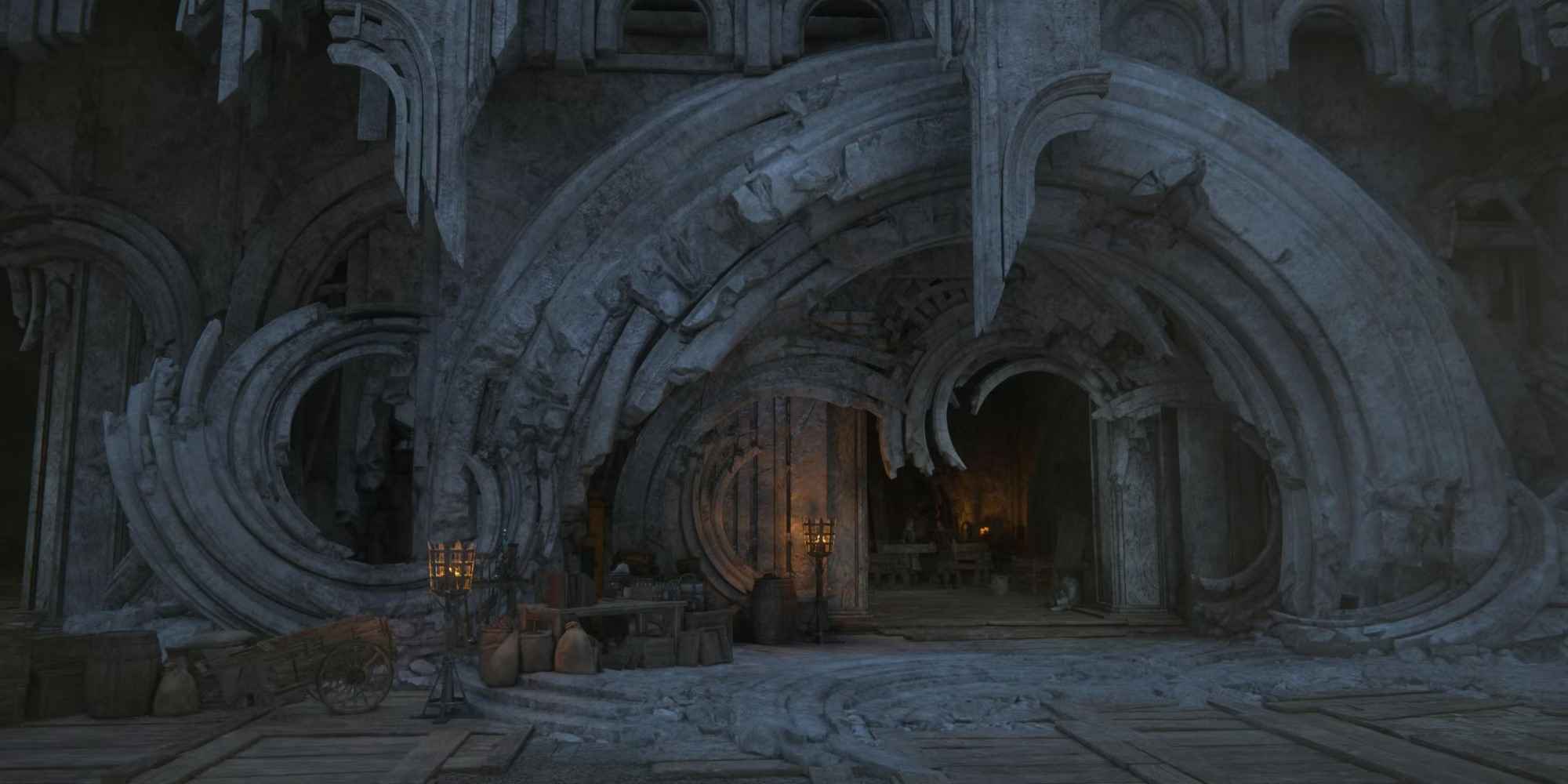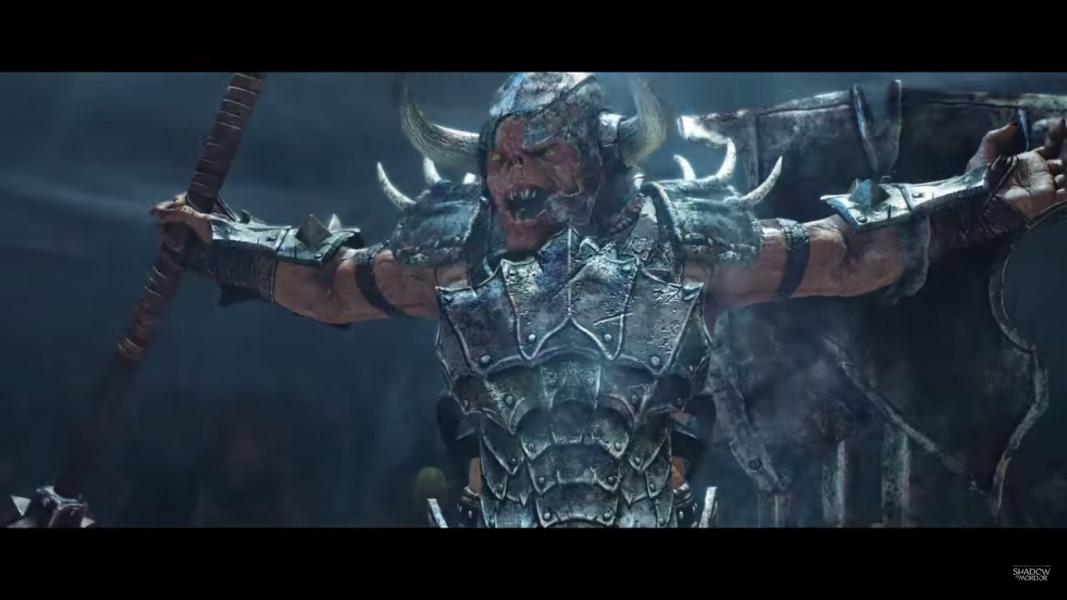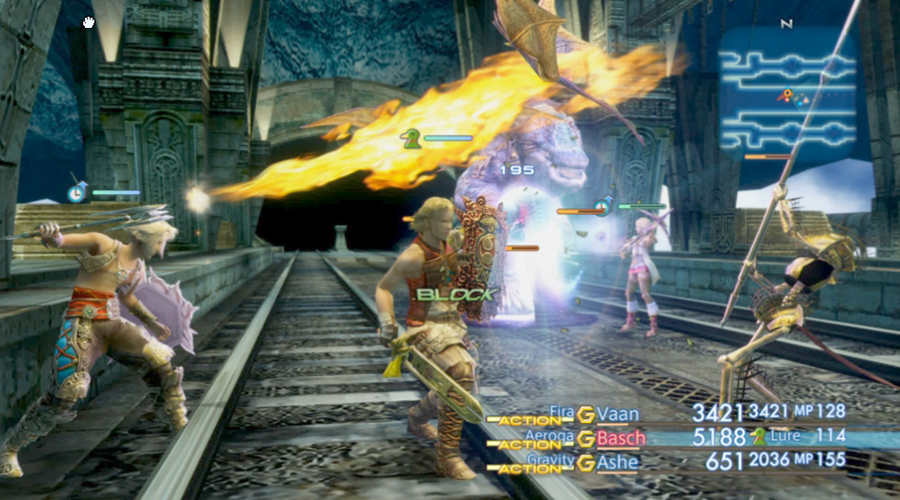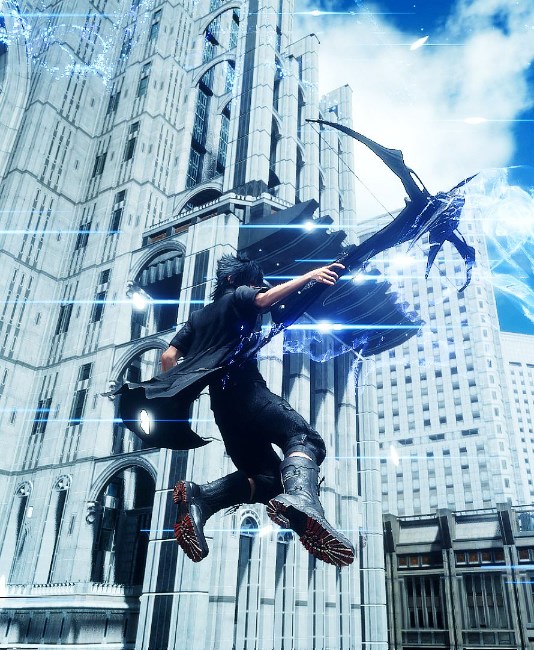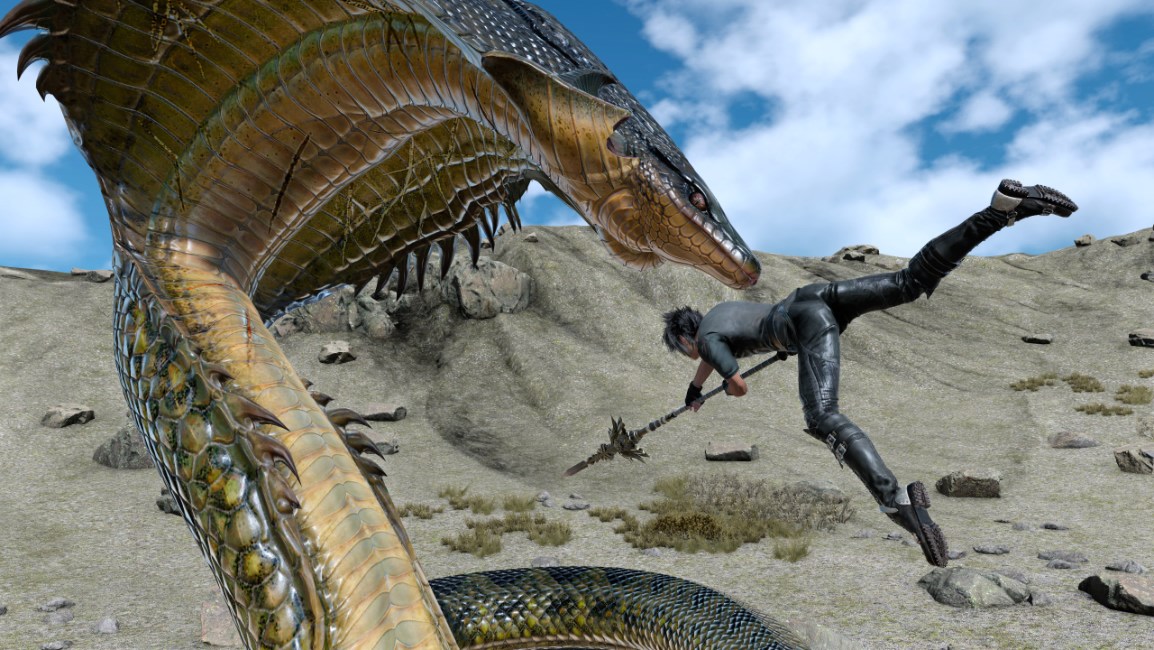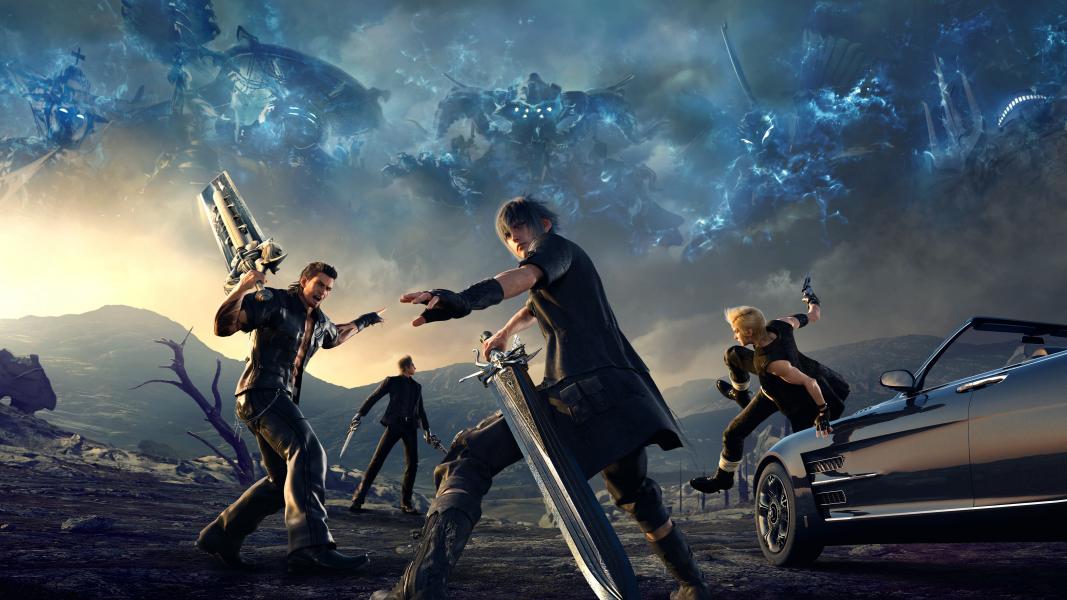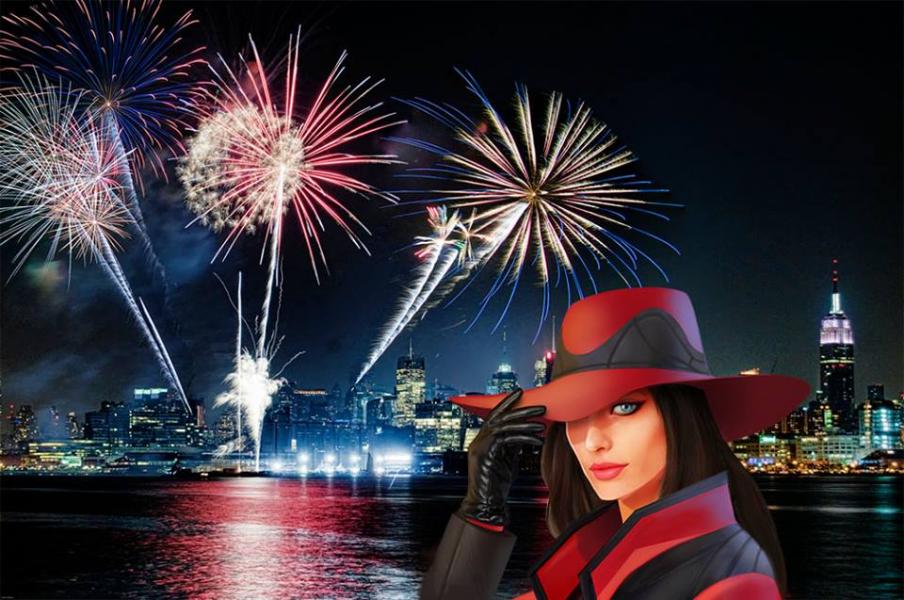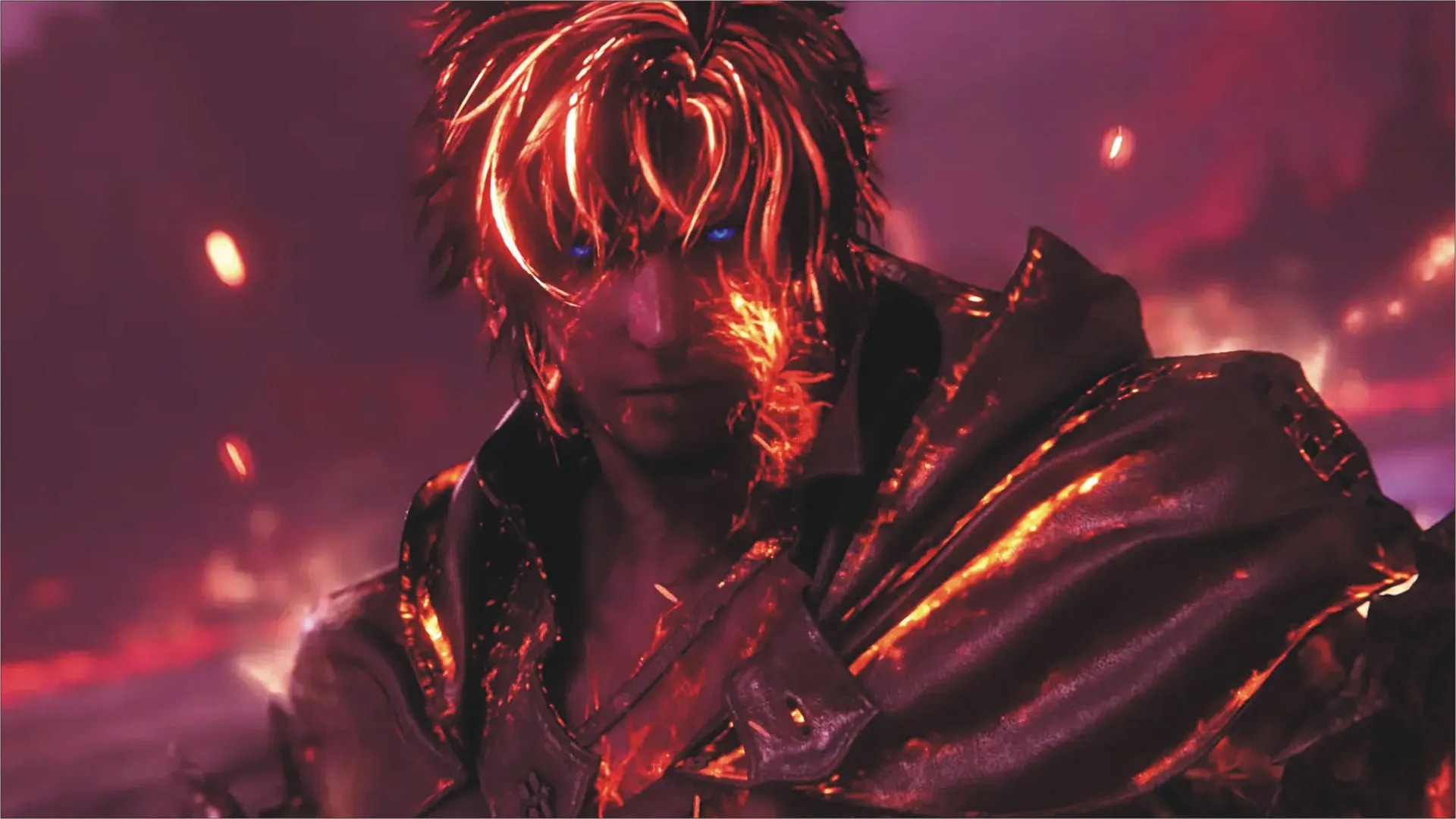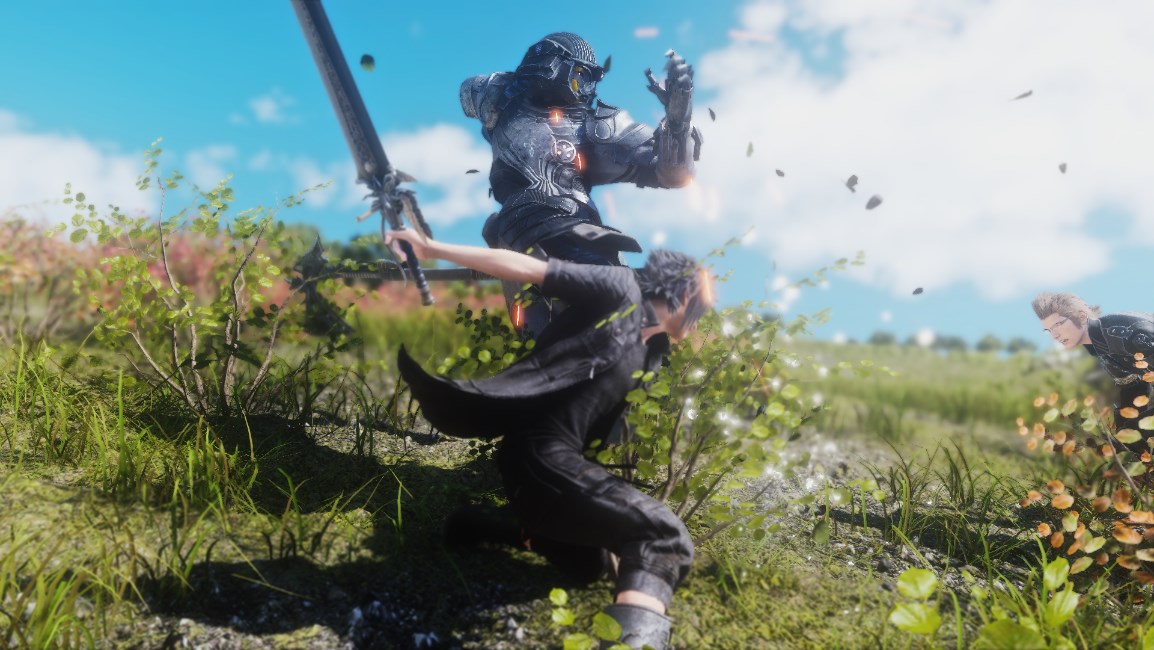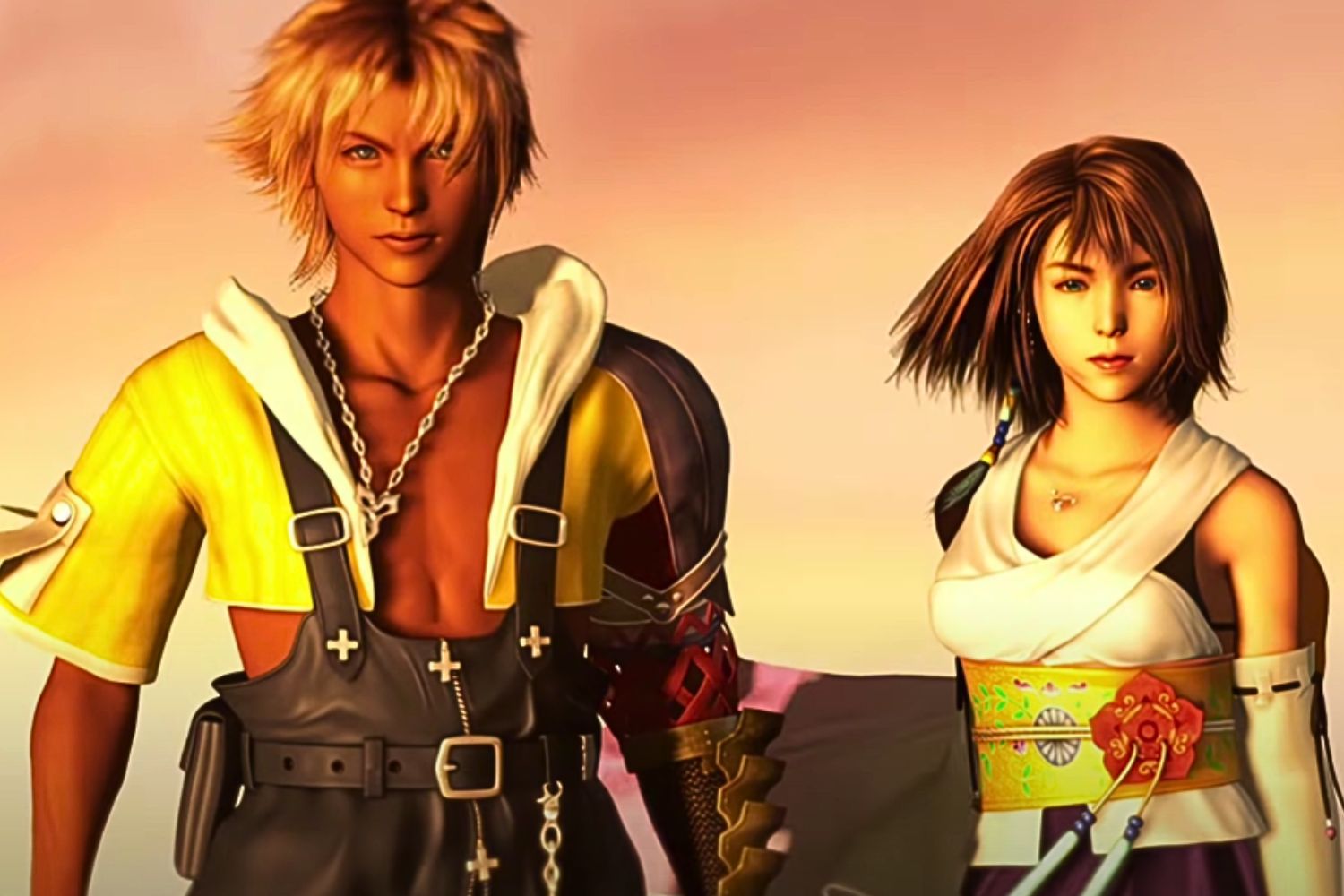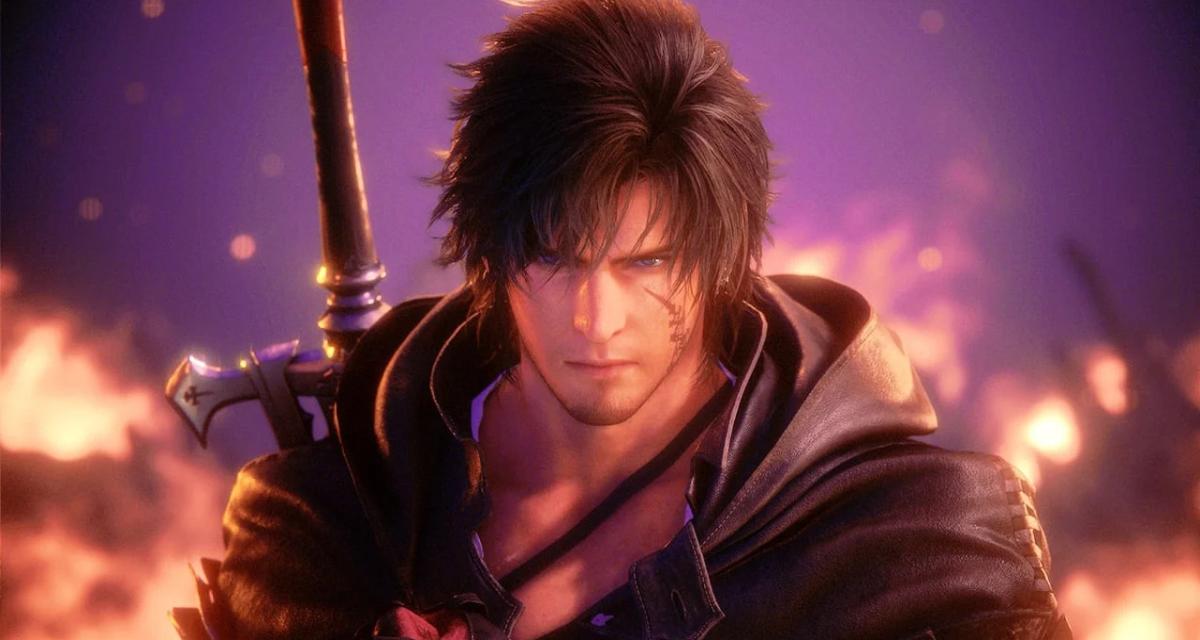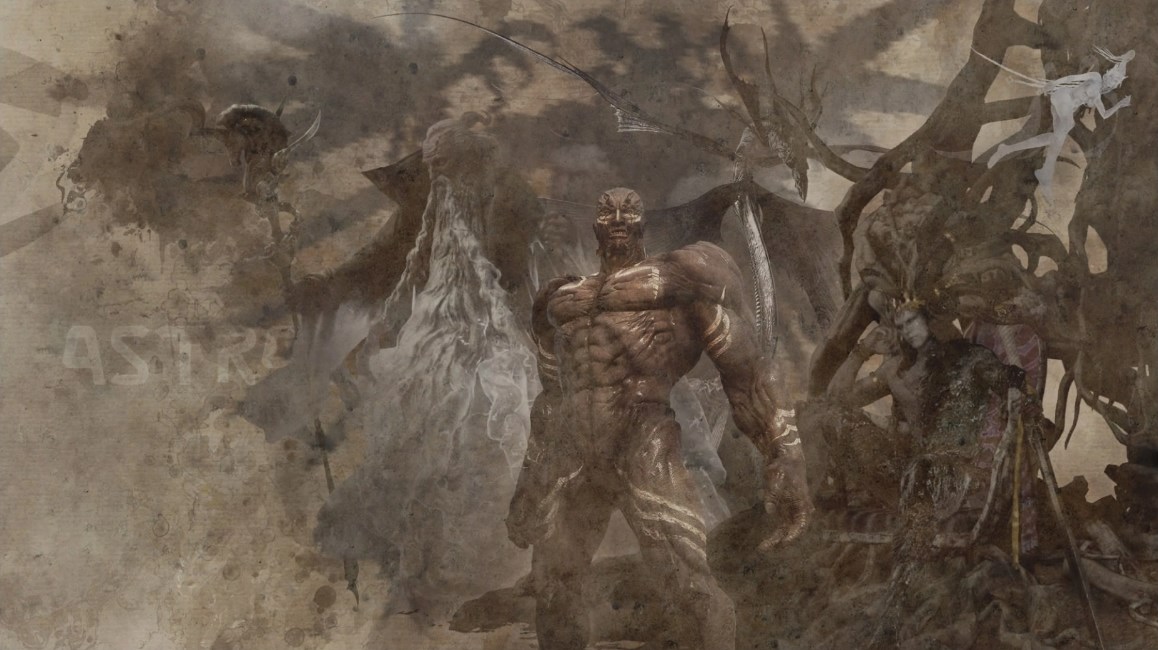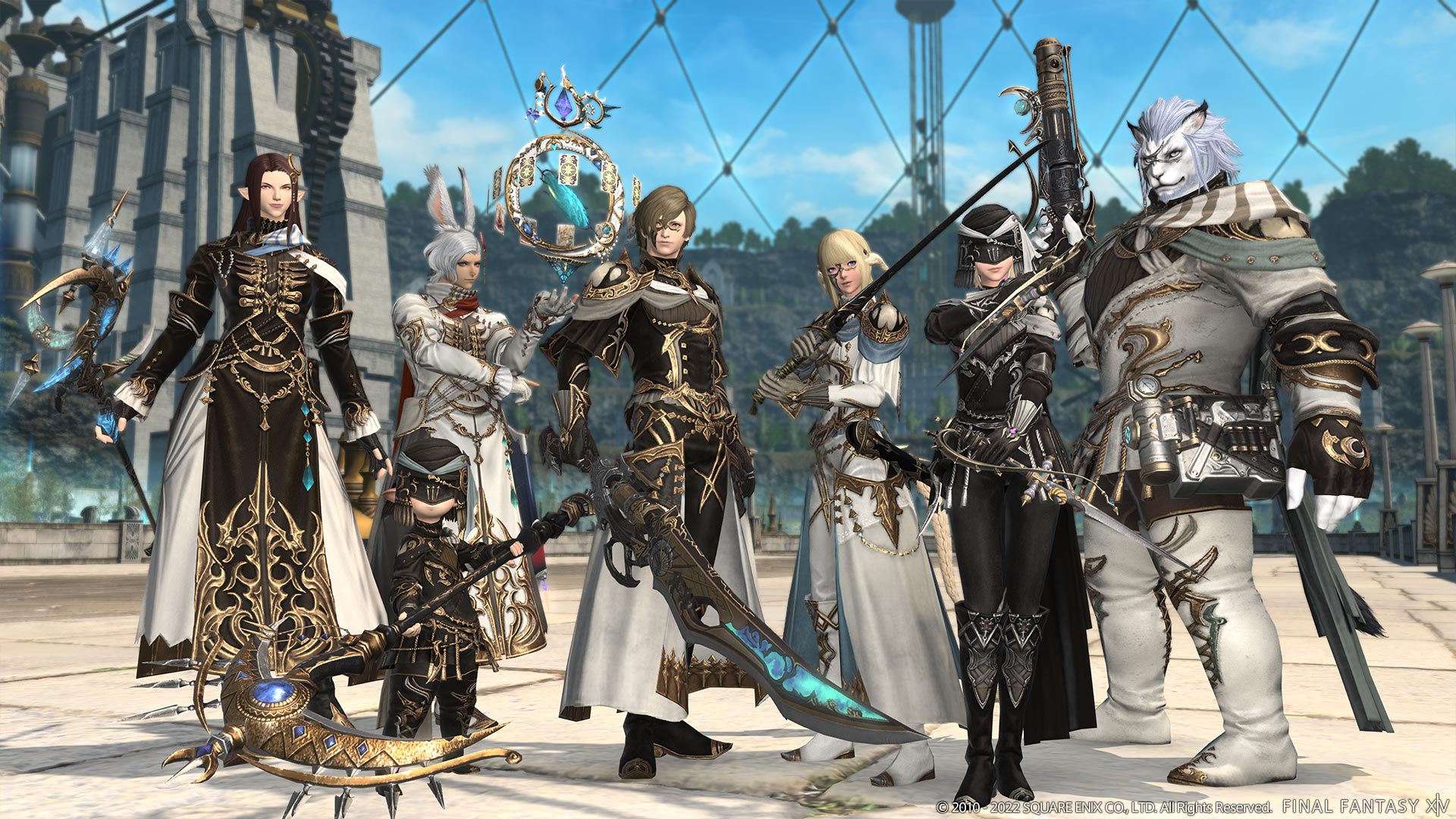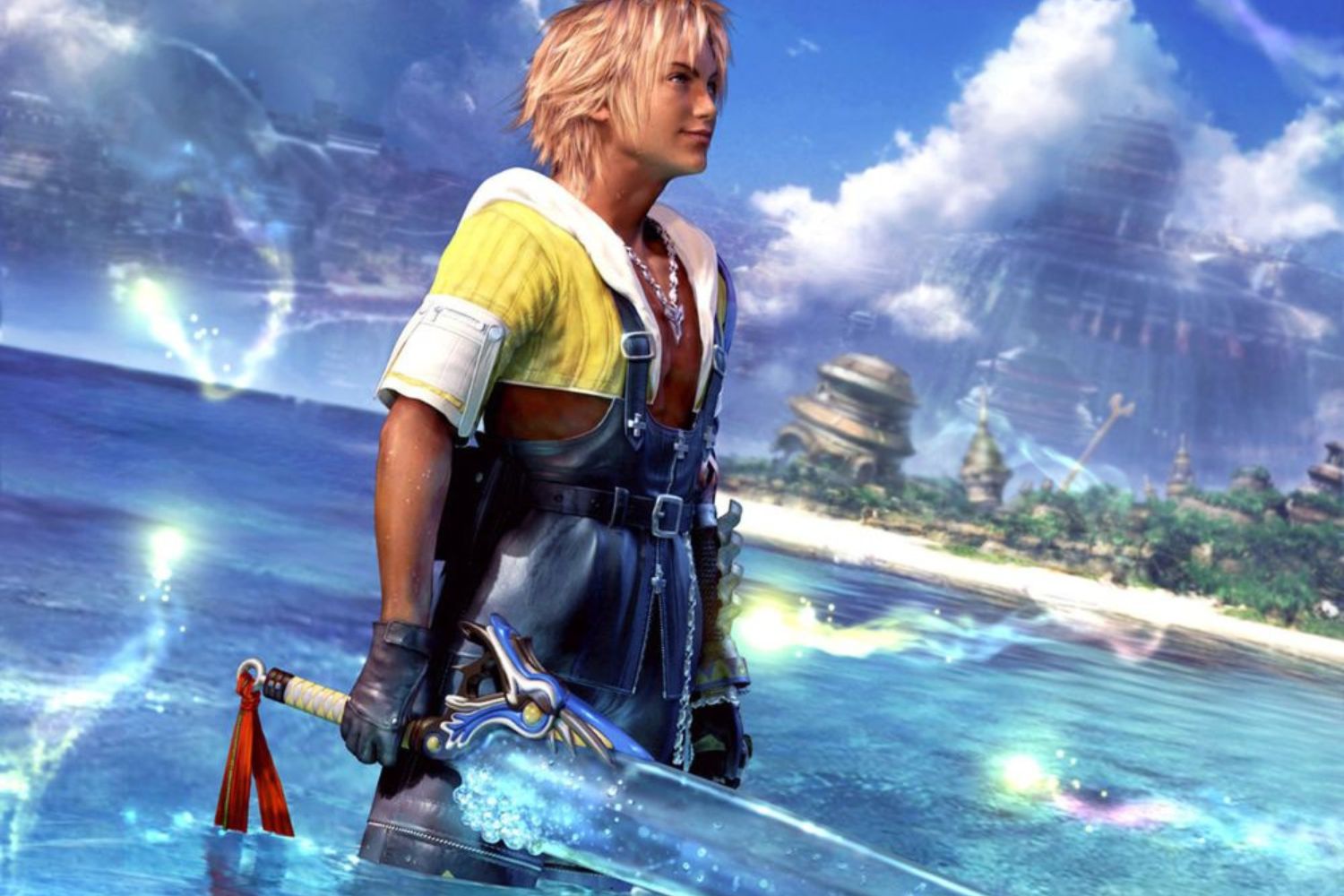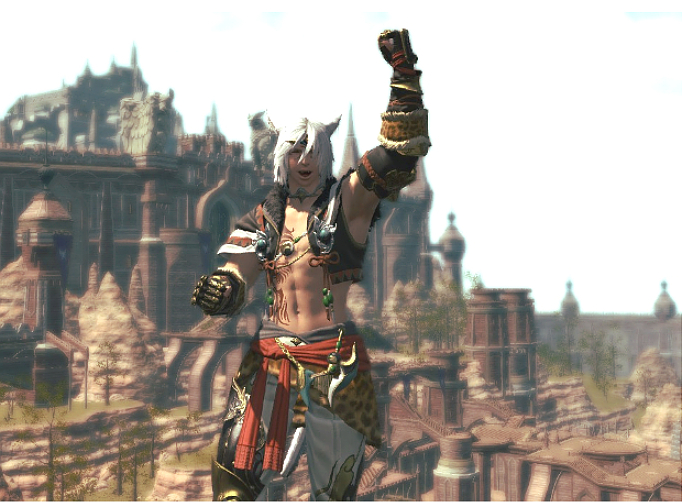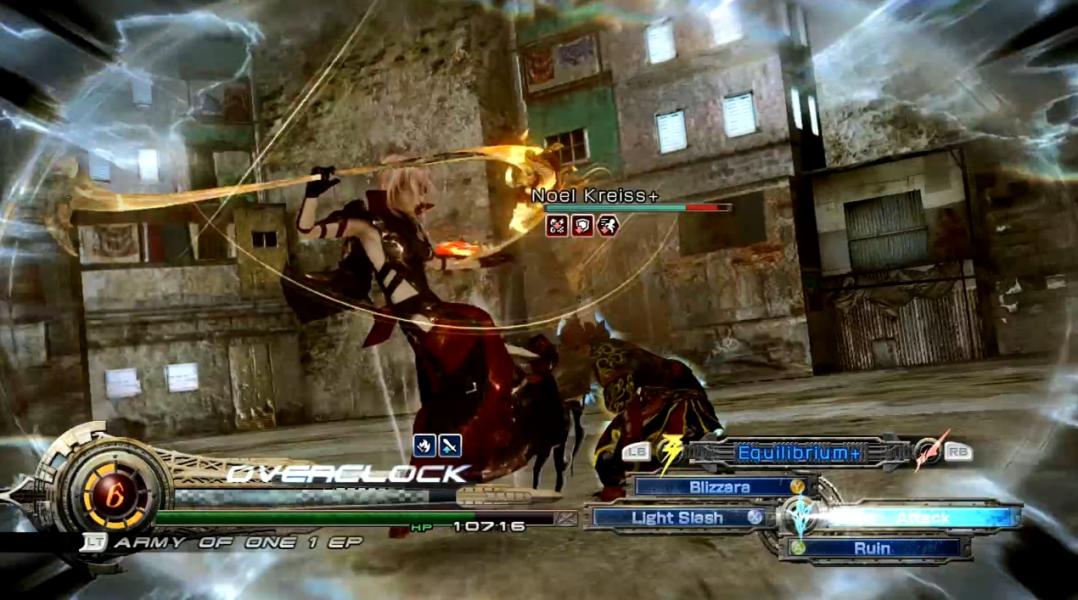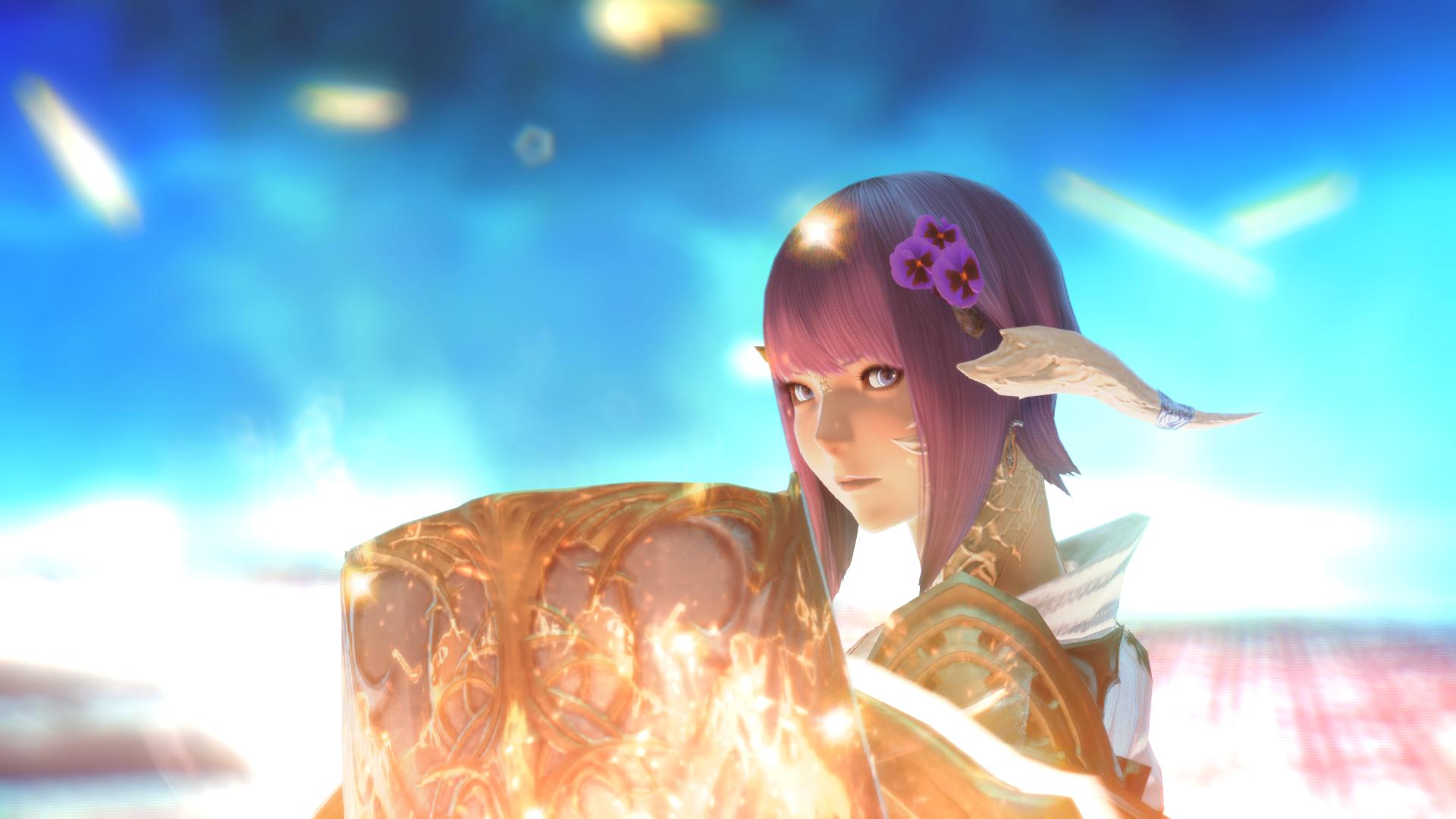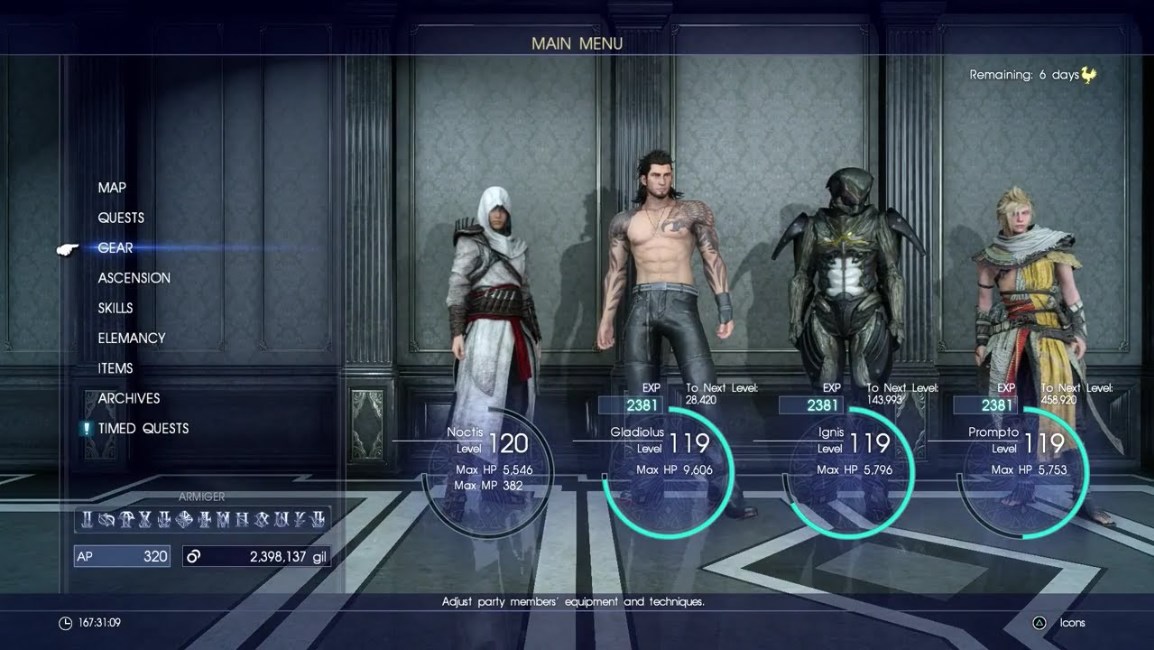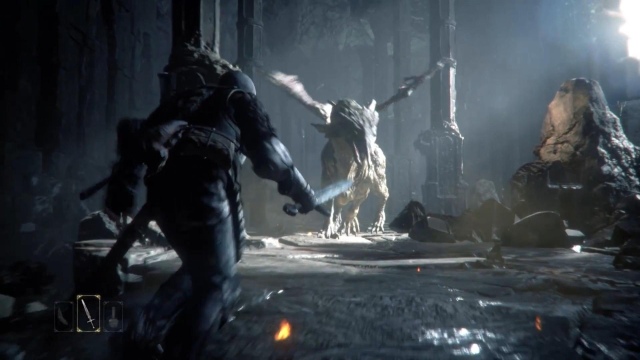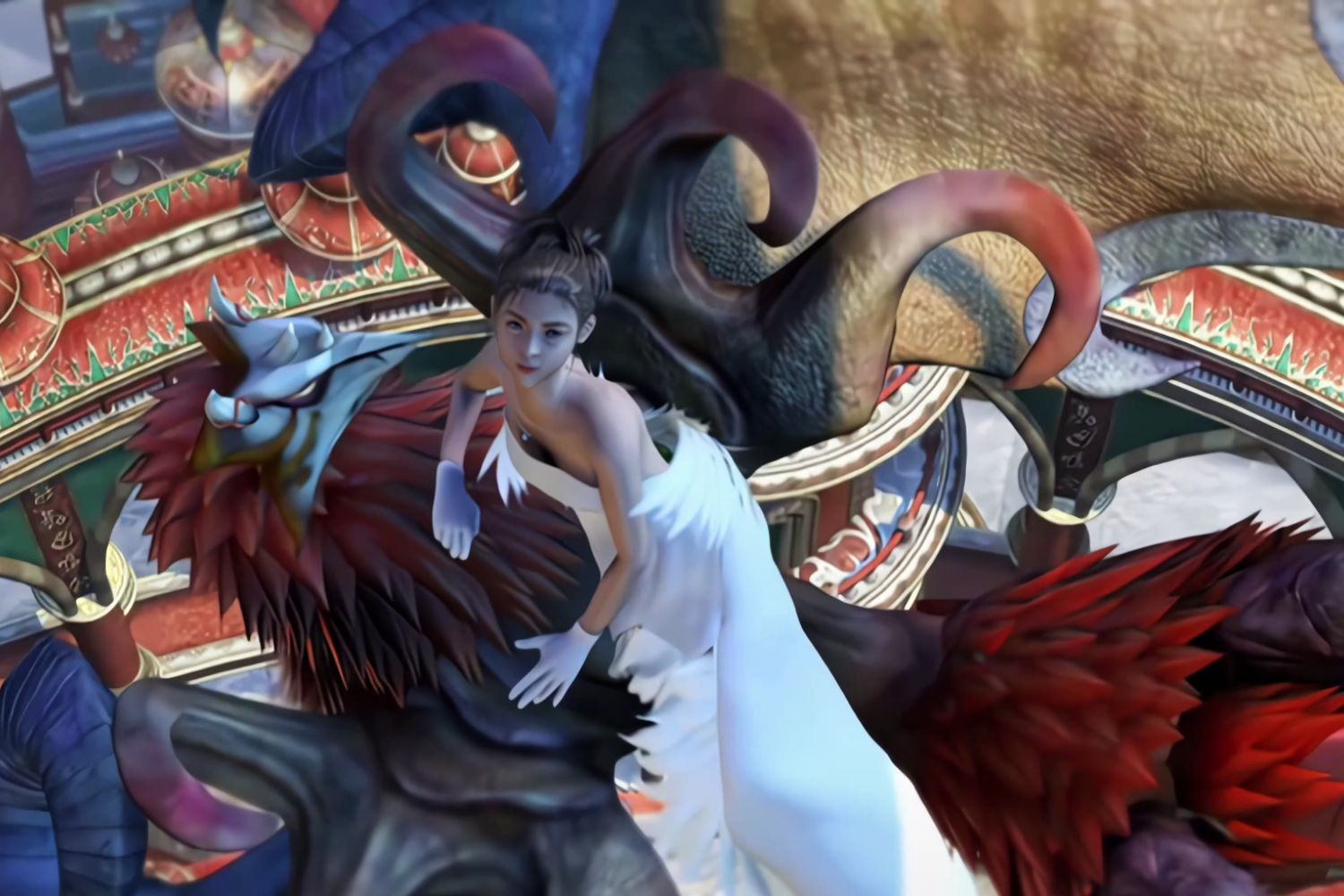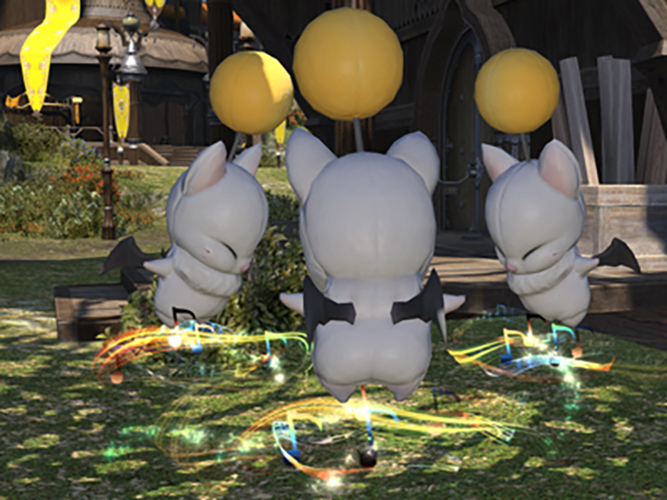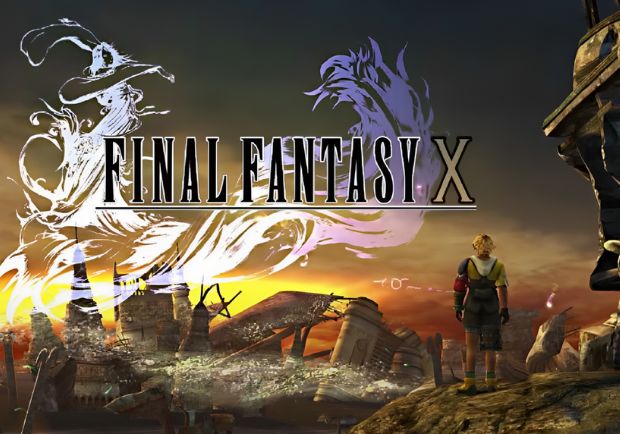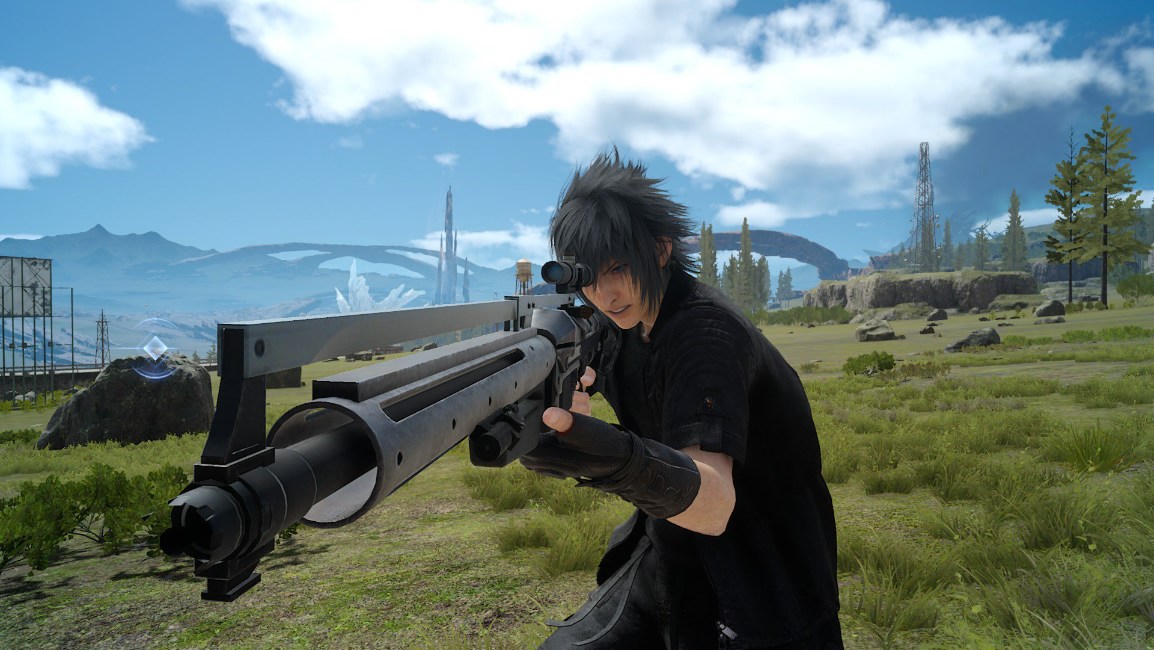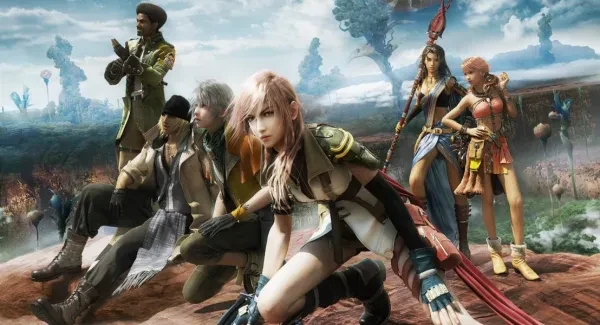
By the power of the crystals and under the guidance of the Four Warriors of Light, here’s your much-needed list of every Final Fantasy game since 1987.
Beginning in 1987, the Final Fantasy franchise has grown to over 60 titles, most of which are video games. With numerous spin-offs—Tactics, Crystal Chronicles, SaGa, and Mana series—several animated television shows, movies, and two massive multiplayer online titles, Square Enix has established a well-known and incredibly popular brand.
After scoring the ultimate comeback with the release of Final Fantasy I, the would-be bankrupt gaming company now employs almost 4,000 people and had a net income of 6,598 billion yen in 2014. In lieu of the upcoming Final Fantasy XV title, we’ve compiled a list of every Final Fantasy title since the very first Final Fantasy I.
1. Final Fantasy I (1987)
Final Fantasy I Gameplay.
After the four elemental orbs (or crystals in the Japanese version) go dark and the world becomes devoid of all elements, four Warriors of Light appear. With one of the darkened orbs in their possession, they begin their journey to restore light to a world of darkness.
Playable on the Nintendo Entertainment System (Famicon in Japan), Final Fantasy I was created as Square’s last game before they were meant to file for bankruptcy. However, the commercial success of the Final Fantasy title kept Square from having to close its doors.

Final Fantasy I title screen and battle. I think drinking is the best option here.
2. Final Fantasy II (1988)
Final Fantasy II Gameplay.
Final Fantasy II, released in Japan for the NES and then only later released in the United States, was the sequel to Final Fantasy I, but lacked any of the same characters or locations from the first title. This game begins with Firion, Maria, Guy, and Leon, who are attacked and left for dead by a group of Palamecian Black Knight Soldiers. After Princess Hilda rescues Firion, Maria, and Guy, the group sets off to find Leon.
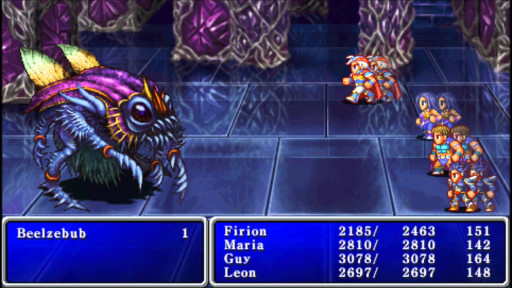
Satan reincarnated as a giant bug, creature… thing? Anyway, they eventually find Leon.
Because Final Fantasy II wasn’t originally released in the U.S. until much later, Final Fantasy IV was originally titled as Final Fantasy II so American players wouldn’t be confused.

The Emperor is pretty scary, so we aren’t sure why Leon appears to be napping.
3. Final Fantasy: Legend I (1989)
Final Fantasy: Legend I Gameplay.
Final Fantasy: Legend I, while not technically a Final Fantasy game, is nonetheless on our list because it was the first RPG game on the Game Boy, and it had significant influence on future franchises like Pokemon. In this game, which is centered around a tower that houses several different Worlds, four heroes attempt to climb the tower to paradise. While this title doesn’t have a main antagonist, the final boss battle in the game has the four heroes fighting the Creator—who is known as God in the Japanese version.

Hmm… 666 HP. A good omen or a bad one when fighting against the Creator?
Part of the SaGa series and not initially part of the Final Fantasy franchise, Square decided to title the game Final Fantasy: Legend I before releasing it overseas on Game Boy. By calling the game Final Fantasy, Square hoped to sell more copies by connecting it with the already popular franchise. This marketing scheme worked as Final Fantasy: Legend I became Square’s first game to sell over a million units.

A layout of the Desert Town in Ashura’s World.
4. Final Fantasy III (1990)
Final Fantasy III Gameplay.
Final Fantasy III, the third game in the Final Fantasy series and fourth installment in the franchise, begins with an earthquake opening up a mysterious cavern. Four orphans decide to explore the cavern and discover a crystal of light. With the crystal in their possession, the orphans embark on a journey to restore balance to the world.
While only initially released in Japan in 1990 for the Famicom platform, Final Famtasy III wasn’t released in North America in 2006 for the Nintendo DS.

The DS graphics are better than the NES graphics anyway.
5. Final Fantasy: Legend II (1990)
Like the previous Final Fantasy titles, Final Fantasy: Legend II is a sequel to Legend I, but the storyline, characters, and places are completely different. The game begins when the protagonist decides to set off on a journey to find their father, only to discover that he was part of a secret society that was dedicated to finding the MAGI, shards from an ancient statue that have magical properties. The hero sets off with a group of friends in search of the MAGI shards and, like Legend I, these characters have the ability to travel to other worlds (and also, they can kill gods).

You have a lot of opportunities to disappoint your mother. Don’t.
As the second game in the SaGa series and the fifth game in the Final Fantasy franchise, Legend II was re-titled to boost sales overseas. While the game was initially released on Game Boy, a remake of it was released for the Nintendo DS and even included a multiplayer mode.
6. Final Fantasy: Adventure (1991)
Trailer for Adventures of Mana, the Final Fantasy: Adventure remake.
Like the SaGa series, Final Fantasy: Adventure is a spin-off of the original Final Fantasy series, and the first game in the Mana series. The main antagonist in this game, the Dark Lord of Glaive and his cohort Julius, attempt to destroy the Tree of Mana and doom the world. Your job as the protagonist is to stop this from happening.
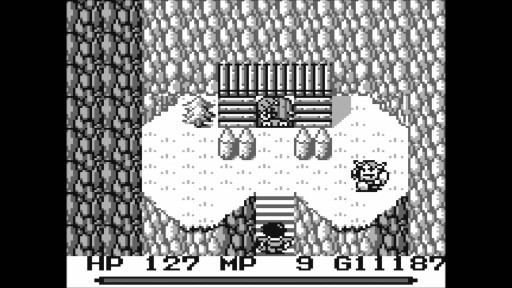
Ah, look at those fine Game Boy graphics.
Originally released for the Game Boy, the game has undergone several remakes. The most recent remake was in February of 2016 with Adventures of Mana being released on iOS and Android devices. Although the Mana series went on to become its own, successful RPG franchise, we included it on our list because the original Final Fantasy Adventure game included chocobos.
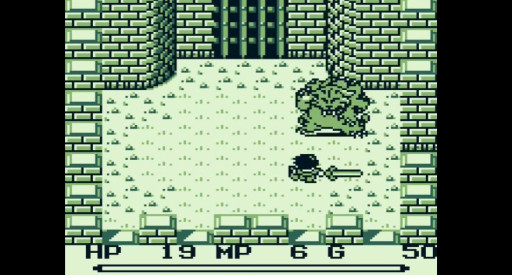
And also, this cat-monster… thing. Meow.
7. Final Fantasy IV (1991)
Final Fantasy IV Gameplay
In the fourth game in the Final Fantasy series, a villain named Golbez takes control of powerful crystals and plans to destroy the world. As the dark knight Cecil, players try to prevent the world’s destruction.
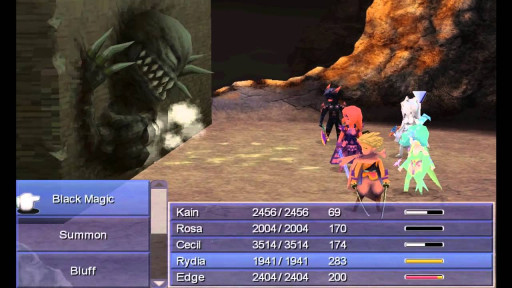
If the Demon Wall looks familiar, it should! It appears in the Great Gubal Library in Final Fantasy XIV: Heavensward.
Because Final Fantasy II and III weren’t initially released outside of Japan, Final Fantasy IV was titled Final Fantasy II during its overseas release. Initially only playable on the SNES (Super Famicon in Japan), several remakes were released from 2007-2014 and are playable on the Nintendo DS, iOS, Android, and Windows.
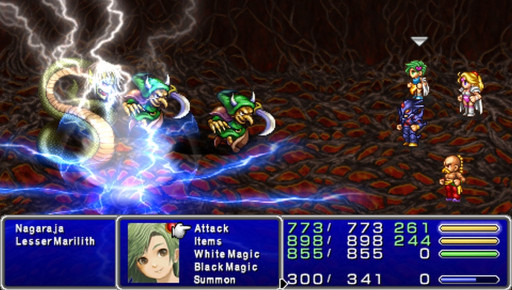
Enemy battle from Final Fantasy IV: The Complete Collection.
8. Final Fantasy: Legend III (1991)
Final Fantasy: Legend III Gameplay.
The third and final title in the SaGa series and the eighth installment in the Final Fantasy franchise, Final Fantasy: Legend III combines fantasy and sci-fi elements in this action-adventure RPG. Three heroes are sent back in time to prevent a massive, global flood—courtesy of the Pureland Water Entity—from obliterating the planet. In order to defeat the Entity, players must collect pieces of their time traveling ship, the Talon, from the past, present, and future.

The game map included in the original release of Final Fantasy: Legend III
Initially released in Japan for the Game Boy, Legend III was not released overseas until 2 years later in 1993. In 1998, all three Legend titles were re-released in the United States, and, more recently, an enhanced remake of Legend III for the Nintendo DS was released in 2011.
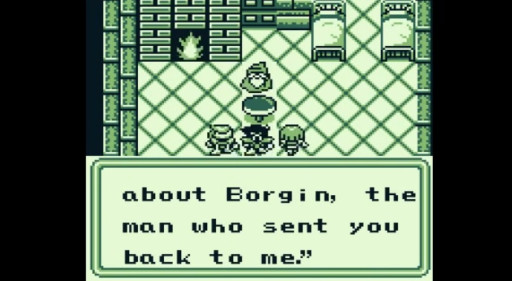
With these graphics, this game could be Final Fantasy or Pokemon or Zelda.
9. Final Fantasy: Mystic Quest (1992)
Final Fantasy: Mystic Quest Gameplay.
Final Fantasy: Mystic Quest, like the Adventure title that came before it, is a spin-off of the Final Fantasy series. Similar to Final Fantasy I, players begin their journey as the hero Benjamin (or whatever you want to call him), who attempts to regain a set of stolen crystals—crystals that control the world’s elemental powers. The main antagonist, who isn’t revealed until the end of the game, wants to enslave mankind, and it’s up to Benjamin and his trusty, Old Man sidekick to save the day.

No, that’s not Legend of Zelda: A Link to the Past.
Released on the Super NES, Mystic Quest is unlike other Final Fantasy titles because it has been vastly simplified. Originally marketed as a game for the entry-level RPGer, Mystic Quest has retained its reputation for being a beginner’s Final Fantasy.
10. Final Fantasy V (1992)
Final Fantasy V Gameplay
Released only in Japan for the SNES and then released in North America on the PlayStation in 1999, Final Fantasy V follows the protagonist Bartz as he attempts to keep Exdeath, the story’s main antagonist, from resurging. Like Final Fantasy I, the crystals in this game also govern the world’s elements and act as a seal against Exdeath.
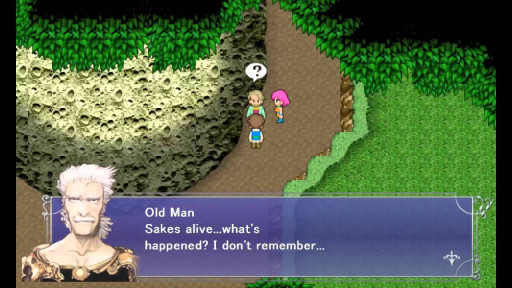
Bartz is wondering how this old man stays so trim and wrinkle-free.
Eventually achieving “Greatest Hits” status on the PlayStation in North America, Final Fantasy V initially sold over two million copies in Japan alone.

I’m not sure smoking would help Bartz in his fight against Melusine.
11. Final Fantasy VI (1994)
Final Fantasy VI Gameplay.
Final Fantasy VI features a group of rebels who want to overthrow an imperial dictatorship. Unlike other titles in the Final Fantasy series, this game allows players to play as any one of fourteen permanent characters.

For being played on an Android device, the graphics look pretty good.
Because Final Fantasy II, III, and V were not released outside of Japan until much later, Final Fantasy VI was titled as Final Fantasy III. Playable on the SNES, PlayStation, Gameboy Advance, Android, iOs, and Windows, Final Fantasy VI has been ranked as the number one RPG of all time.
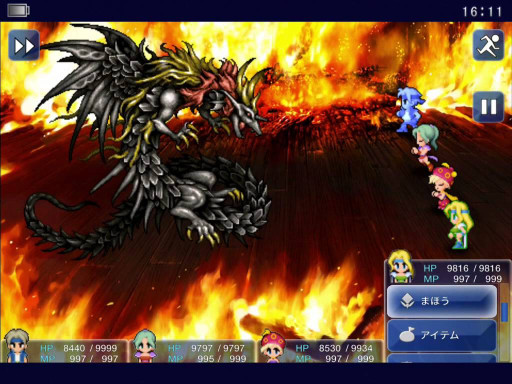
Running the game makes your phone pretty hot, so those flames might actually burn you.
12. Final Fantasy VII (1997)
Final Fantasy VII Gameplay.
Perhaps the most well-known and best loved video game in the Final Fantasy franchise, this iconic PlayStation game lets players take control of the famous Cloud Strife. As part of the eco-terrorist group AVALANCHE, Cloud and his group attempt to prevent Shinra, a mega-corporation, from sucking the life out of the planet to use as energy. When Cloud becomes embroiled in an even larger, world-saving quest, he eventually faces off against one of Square’s most iconic super villains, Sephiroth, the One-Winged Angel.
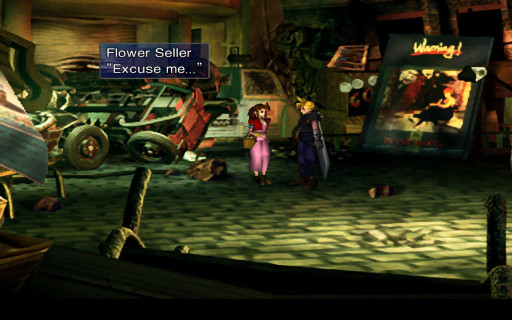
And you get to relive the depressing Aerith/Cloud subplot.
Considered one of the greatest games of all time and with a remake recently announced at E3 2015, Final Fantasy VII has sold more than 11 million copies since 1997.

Updated graphics for the cellular version. Who knows why Cloud has an extra leg coming out of his hip?
13. Final Fantasy Tactics (1997)
Final Fantasy Tactics Gameplay
Another spin-off to the Final Fantasy series is Final Fantasy Tactics, released for the PlayStation in 1997 (Japan) and 1998 (North America). Following the story of Ramza Boulve, a cadet who becomes involved in a military conflict known as the Lion War, players roam the fictional world of Ivalice while trying to keep two noble factions from warring over the throne. Like any Final Fantasy game, there’s a more sinister plot—and a few strange twists and turns—waiting to be discovered.

Also, these characters have some pretty killer hair.
The first Final Fantasy game to have bitmap sprite characters and a playing field that turns, Tactics has become a cult classic since its initial release.

Bitmap sprites, although updated, are still featured in Tactics for Android and iOS.
14. Final Fantasy VIII (1999)
Final Fantasy VIII Trailer for PC Release
Final Fantasy VIII, another extremely popular Final Fantasy series, lets players take control of the iconic Squall Leonhart (possibly the same Leon from Final Fantasy II) as he leads a group of SeeD mercenaries. While the initial antagonist is Edea, Squall and his mercenaries eventually discover that they must stop the villain Ultimecia, who wants to compress time.
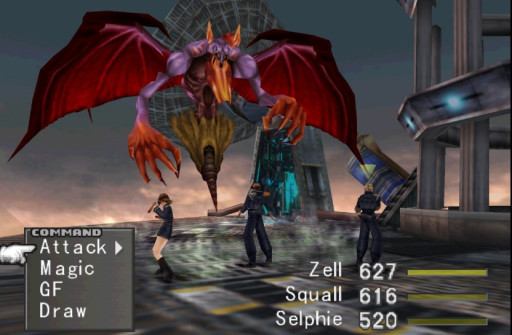
I bet many of us remember Selphie when she was just a young girl in Kingdom Hearts.
Initially released for the PlayStation, but now playable on Windows, Final Fantasy VIII had sold 8.5 million copies by 2013. Named as the fastest-selling Final Fantasy game, VIII had amassed $50 million only 13 weeks after its initial release.
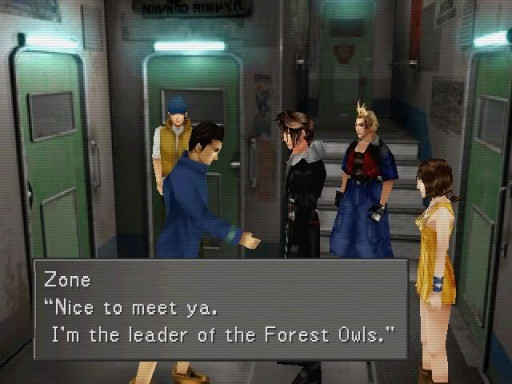
Sure, Squall isn’t friendly, but the game does begin with him getting slashed in the face.
15. Final Fantasy IX (2000)
Final Fantasy IX Gameplay
With ports for iOS, Android, and Windows released in early 2016, Final Fantasy IX follows the story of a thief named Zidane Tribal, who, with others, attempts to overthrow the Queen of Alexandria, Brahne. Like Final Fantasy VIII, the antagonist in IX changes when Zidane and his party realize that a more threatening force named Kuja is in cahoots with Brahne.

Did anyone else ever wonder why Zidane has a tail?
Influenced by the earlier Final Fantasy titles and given the highest Metacritic score for any Final Fantasy game, Final Fantasy IX has sold 5.3 million copies only 3 years after its release.

Kudos to those who completed the mock sword fight on their first try.
16. Final Fantasy X (2003)
Final Fantasy X Gameplay
As the first Final Fantasy game to feature voice acting, the 10th installment in the main Final Fantasy series is about a young Blitzball star named Titus who finds himself in the mythical world of Spira after his city, Zanarkand, is destroyed by a villain named Sin. In Spira, Titus meets up with the summoner Yuna (amongst others) as she embarks on a pilgrimage to defeat Sin.
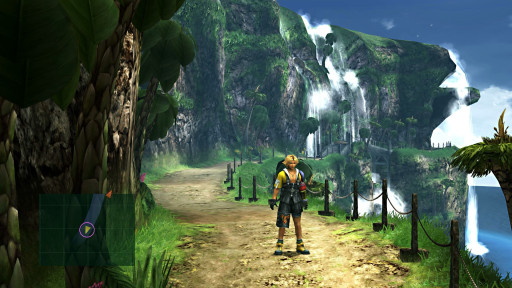
Titus wants to get back to Zanarkand because island life is way too hot.
Unlike other titles in the series, Final Fantasy X is the first game to have a direct sequel, X-2. Both games, playable on PlayStation 2 and Windows, have sold 14 million units since 2013.
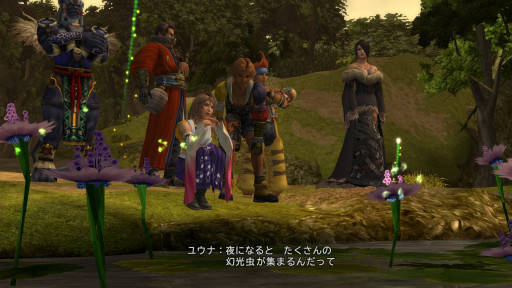
The gang’s all here: Kimahri, Auron, Wakka, Lulu, Titus, and Yuna. Also, flowers.
17. Final Fantasy XI Online (2002)
Final Fantasy XI Online Gameplay
As the first MMORPG in the Final Fantasy franchise—and one of my personal favorites—Final Fantasy XI Online is a punishing, but incredibly addictive, game. Set in the fantasy world of Vana’Diel, players choose their race, their job, and their starting nation, before embarking on a journey to stop the Shadowlord—all while leveling up, completing missions and quests, and making friendships along the way.

A Redmage in a losing battle against several Orcs in Ghelsba Outpost.
With 5 expansion packs and 6 add-on scenarios, Final Fantasy XI Online has thousands of hours of playable content. However, despite being released for PlayStation 2, Xbox 360, and Windows, only the servers for the PC version of the game are still up and running, with an iOS and Android version of the game currently under development.
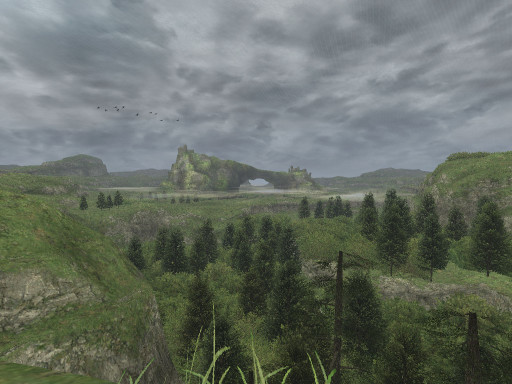
It may not look like much now, but getting to see the Ruins of Tavnazia was serious cause for celebration.
18. Final Fantasy: Tactics Advance (2003)
Final Fantasy: Tactics Advance Gameplay
Borrowing several traits from Tactics, Tactics Advance for the Game Boy Advance is another spin-off of the Final Fantasy franchise. The story follows four children—Marche, Mewt, Ritz, and Doned—in the fictional world of St. Ivalice. Unlike previous titles, which generally focus on a single antagonist bent on taking over the world, Tactics Advance is about Marche’s journey back to St. Ivalice after a magical book transports him and his friends to the realm of Ivalice.
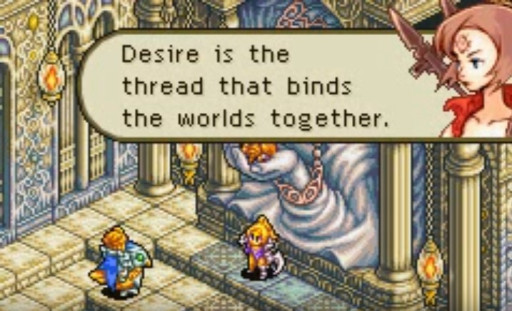
Unfortunately, your desire to get home doesn’t have any magical properties.
While Tactics Advance has yet to have a remake, it is now playable on the Wii U Virtual Console.

Despite this misleading screenshot, you’re riding that chocobo—not fused to it.
19. Final Fantasy X-2 (2003)
Final Fantasy X/X-2 Remastered Trailer
The direct sequel to Final Fantasy X, Final Fantasy X-2 allows characters to take control of Yuna, Rikku, and a newcomer, Payne, in the fictional world of Spira. As political conflicts and tensions are mounting, it’s up to this all-female cast to stop Spira from becoming engulfed in a war.
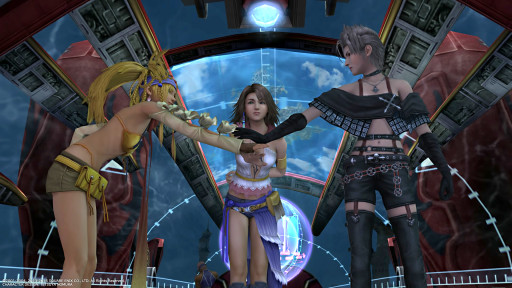
No shirt, no pants, no problem.
Winner of the “Outstanding Achievement in Character Performance” by the Academy of Interactive Arts & Sciences, Final Fantasy X-2 is playable with Final Fantasy X on PlayStation 2, 3, 4, and PlayStation Vita. If you haven’t played X-2, try it out. The dressphere system is pretty fun and visually stunning.

Yuna’s special is channeling the anger of a bride who’s been stood up at the altar. Good luck!
20. Final Fantasy Crystal Chronicles (2003)
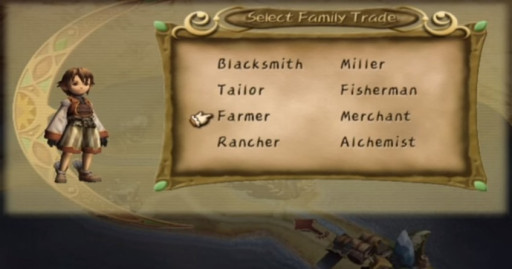
Considering Alchemists can create gold, I’d go with Alchemist.
Originally released on the GameCube, Crystal Chronicles relied on real-time fighting instead of the normal turn-based fighting present in most Final Fantasy games. Crystal Chronicles was also the first RPG that supported GameCube and Game Boy Advance compatibility.
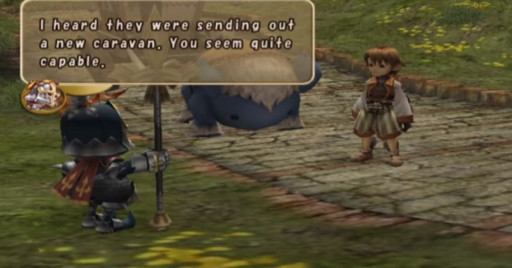
You only seem capable, but eventually you’ll prove yourself.
21. Final Fantasy XII (2006)
Final Fantasy XII Gameplay
Set in the fictional world of Ivalice, Final Fantasy XII follows the story of a group of rebels who rally against the tyrannical Archadian Empire. When the empires Archadia and Rozarria go to war, the small nation of Dalmasca gets caught in the middle. The princess of Dalmasca, Ashe, and Vaan, a wannabe airship pilot (or sky pirate), ban together to create a resistance movement.
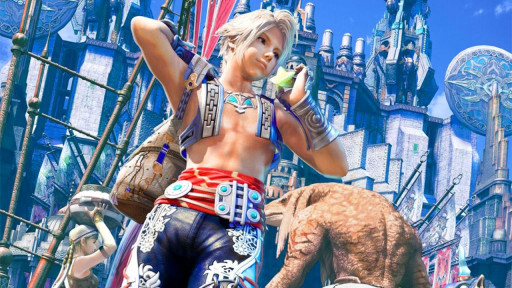
Vaan wants to be a sky pirate because he’s already purchased the outfit for it.
Winning numerous Game of the Year awards and becoming the fourth best-selling PlayStation 2 game of 2006, Final Fantasy XII spawned a sequel, Revenant Wings, and will also have a remastered version, Zodiac Age, coming to the PlayStation 4 in 2017.
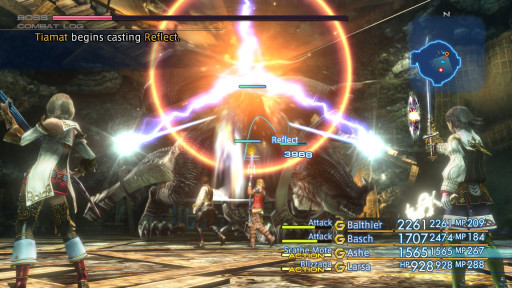
Tiamat boss battle from Zodiac Age.
22. Final Fantasy XII: Revenant Wings (2007)
Final Fantasy XII: Revenant Wings Gameplay
Again taking place in the fictional land of Ivalice, Final Fantasy XII: Revenant Wings begins with Vaan, now a sky pirate and owner of an airship, who is hunting treasure when he and his party come to the floating continent of Lemures. With numerous villains and a twisting storyline, Revenant Wings once again has players killing gods.
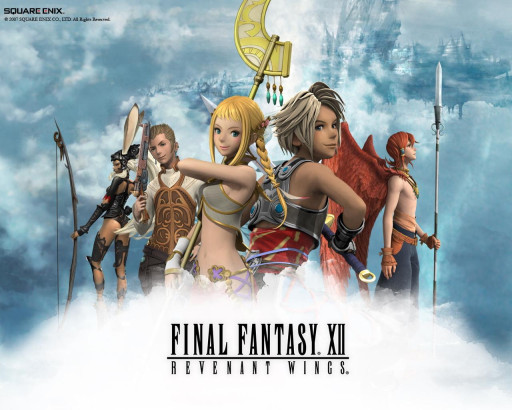
If you think the lack of clothing made this game popular, think again: the DS graphics don’t look nearly as sexy.
Revenant Wings was initially released on the Nintendo DS and, unlike the Japanese version of the game, was made more difficult before its release in North America.
23. Final Fantasy Crystal Chronicles: Ring of Fates (2007)
Final Fantasy Crystal Chronicles: Ring of Fates Gameplay
A prequel to Final Fantasy: Crystal Chronicles, Ring of Fates was released on the Nintendo DS in 2007 in Japan, and in 2008 in North America. The story centers on two twins, Yuri and Chelinka, who end up in a disastrous battle that kills their father and leaves Chelinka in a catatonic state. The adventure picks up when Chelinka wakes up and the twins embark on a journey together. The real antagonist in this story isn’t so much a single villain, but the desire to change one’s fate.
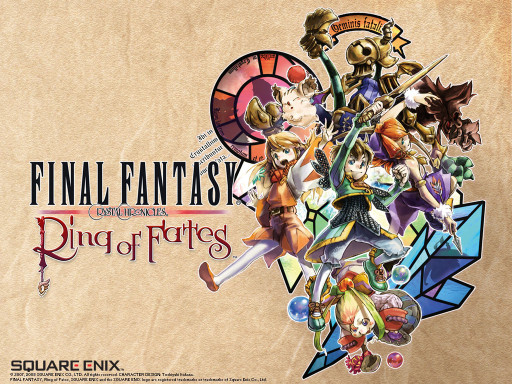
Square Enix's official wallpaper for Final Fantasy Crystal Chronicles: Ring of Fates
Released on Nintendo DS, Ring of Fates makes full use of the DS’s wifi capabilities, and also features voice acting.
24. Final Fantasy Crystal Chronicles: My Life as a King (2008)
Final Fantasy Crystal Chronicles: My Life as a King
A sequel to the first Crystal Chronicles, My Life as a King is a city-building game. In the game, players take control of the son of a king who, in the previous Crystal Chronicles title, lost his kingdom. The purpose of this game is to build a new kingdom from the ground up, and ensure that it’s both prosperous and peaceful.
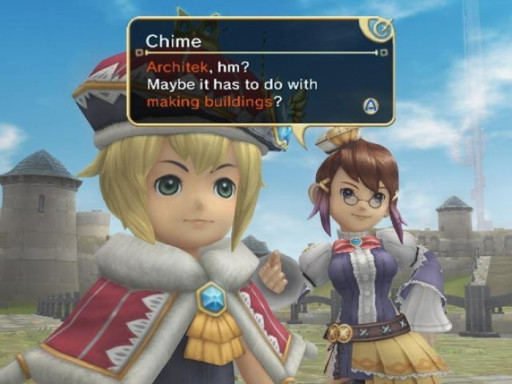
Despite her cute, cartoony look, Chime’s got a lot of sass.
Released as a simulator for the WiiWare service on the Wii console, My Life as a King was developed because Square Enix wanted a high profile game released solely through WiiWare service.
25. Dissidia Final Fantasy (2009)
Dissidia Final Fantasy Gameplay
As the first fighting game in the Final Fantasy franchise, Dissidia Final Fantasy was initially supposed to be a spin-off of the incredibly successful Kingdom Hearts series. In this action-packed fighting game, the goddess Cosmos and the god Chaos summon various warriors to fight against each other. Players take control of the 10 protagonists from the first 10 Final Fantasy titles and square off with Chaos’ own lineup of fighters.
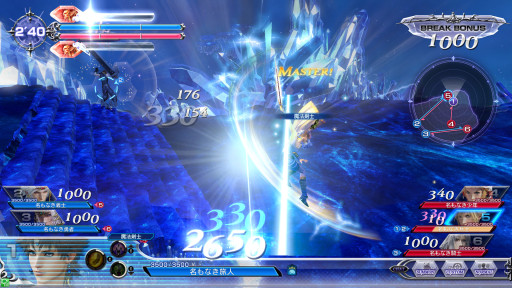
There’s so much going on in this battle, it’s hard to tell where the players even are.
Selling over 1.8 million copies, Dissidia Final Fantasy spawned a follow-up game, Dissidia 012 Final Fantasy.
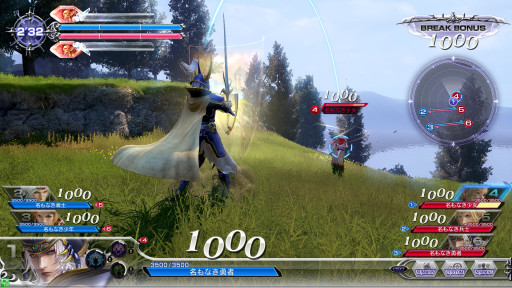
Another beautiful day ruined (or enhanced) by senseless bloodshed.
26. Final Fantasy Crystal Chronicles: Echoes of Time (2009)
Final Fantasy Crystal Chronicles: Echoes of Time Gameplay
The third title in the Crystal Chronicles series, Echoes of Time is a coming-of-age story. The protagonist of the game begins his journey after saving the life of a girl named Eryll. In order to save Eryll, the hero had to make a bargain with the game’s main antagonist, Larkeicus. Like all of the Crystal Chronicles titles, crystals play a significant role in the storyline, especially at the end.
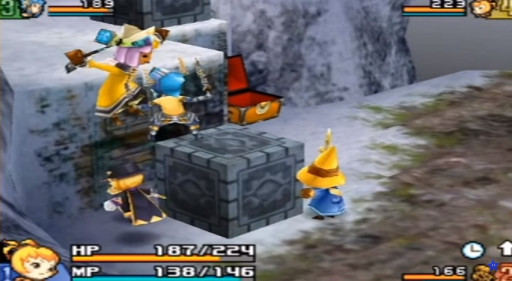
It only looks like you’re fighting that stone.
Although it was released for both the Nintendo DS and the Wii console, Echoes of Time only sold a meager 570,000 copies worldwide by May of 2009.
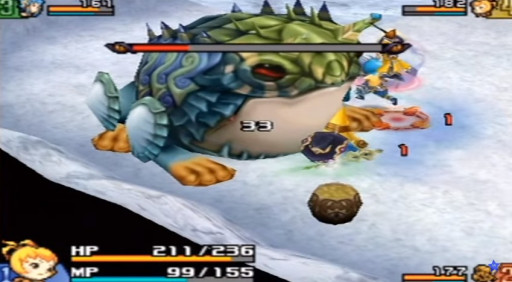
To be far, giant, mechanical toads aren’t terribly exciting.
27. Final Fantasy Crystal Chronicles: My Life as a Darklord (2009)
Final Fantasy Crystal Chronicles: My Life as a Darklord Gameplay
Another Crystal Chronicles game only available through the WiiWare service, My Life as a Darklord is a tower-defense game that lets players play as the villainous Darklord. In this game, players set traps to try and prevent enemies (or, in this case, heroes) from climbing the tower and retrieving the Darklord’s Dark Crystal. Unlike other tower-defense games, My Life as a Darklord is played from the side view of the tower.

Playing from the side view can take some getting used to.
Although the game was called the best WiiWare of the Month in July of 2009, critics noted that it lacked depth and, without purchasing the extra, downloadable content, players were unable to dig deeply into the potential tactics.

But the Japanese had every tactical strategy worked out after an hour of playing.
28. Final Fantasy Crystal Chronicles: The Crystal Bearers (2009)
Final Fantasy Crystal Chronicles: The Crystal Bearers Gameplay
The sixth game in the Crystal Chronicles series and the 28th game in the Final Fantasy franchise, The Crystal Bearers is an action-adventure game set 1,000 years in the future of the Crystal Chronicles world. In this game, magic has been banned, but certain individuals are still born with powers and are called Crystal Bearers. Players begin the game as Layle, a mercenary who’s—you guessed it—also a Crystal Bearer. This games main antagonist, Jegran, is particularly evil because he wants to not only take over the world, but also get rid of the Crystal Bearers (except himself).

Crystal Bearers aren’t well-liked. The sass here is dually noted.
Available only on the Wii, The Crystal Bearers received middling reviews. Because this Final Fantasy title deviated from its usual RPG genre in favor of an action-adventure one, the game was criticized.
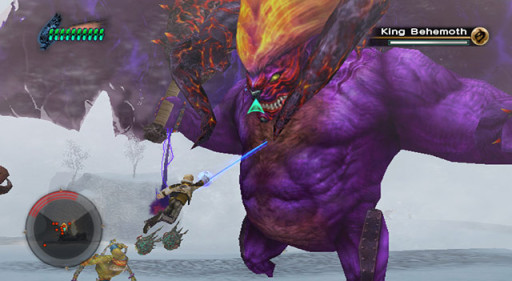
I don’t criticize any Final Fantasy title that lets you slay King Behemoth.
29. Final Fantasy XIII (2009)
Final Fantasy XIII Gameplay
Released for PlayStation 3, Xbox 360, Windows, Android, and iOS, Final Fantasy XIII centers around the former soldier Lightning who attempts to save her sister from the corrupt government, Sanctum, on their home world of Cocoon. The game begins with Sanctum ordering the mass purge of citizens who’ve come into contact with something from Pulse, the feared world situated below Cocoon. Aside from saving Lightning’s sister, players will also have to save Cocoon.

He looks pretty shocked. Probably because he’s one of the few black people to appear in a Final Fantasy title.
Final Fantasy XIII became the fastest selling game in the history of the Final Fantasy franchise and, by 2013, had sold over 6.6 million units. This particular title was popular enough that two sequels—Final Fantasy XIII-2 and Lightning Returns: Final Fantasy XIII—were made.
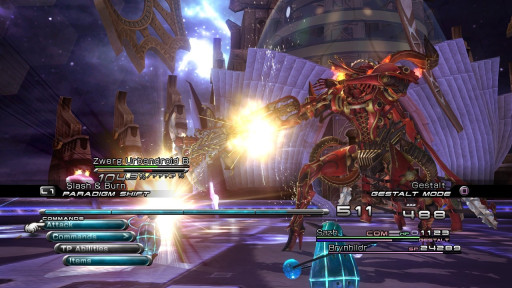
Another battle where there’s so much going on, you can’t even see your team.
30. Final Fantasy: The 4 Heroes of Light (2010)
Final Fantasy: The 4 Heroes of Light Trailer
The 30th installment in the Final Fantasy franchise and another spin-off from the main series, The 4 Heroes of Light centers around a 14-year-old named Brandt who has to free his home from a terrible curse. Brandt, along with three other kids, travel the world to figure out how to undo an evil witch’s curse that has caused everyone in the town of Horne to turn to stone. Like previous Final Fantasy titles, the heroes eventually fight immortal beings, except instead of gods like Apollo or God, the characters take on the likes of Satan in his many incarnations (Mammon, Lucifer, Beelzebub, etc.).

How can this look so cute when you have to fight Satan at the end?
Released for the Nintendo DS in Japan in 2010 and then released a year later in North America and Europe, The 4 Heroes of Light is a sort of throwback to the SNES Final Fantasy titles. A sequel to this game was created, but it didn’t make our list because it wasn’t part of the Final Fantasy franchise.

The game’s cartoony art style is reminiscent of Legend of Zelda: Wind Waker.
31. Dissidia 012 Final Fantasy (2011)
PlayStation Portable
Dissidia 012 Final Fantasy Gameplay
Both a sequel and a prequel to Dissidia Final Fantasy, this awkwardly-titled fighting game expands on the events that led up to the thirteenth war between Cosmos and Chaos. The first part of the game features the twelfth war between the goddess and god, while the second part is just a repeat of the events from Dissidia. The game improvements upon the gameplay from the previous title, and it also adds in new side missions to give some variety to the second half of the game.
Having a reputation for being one of the best PlayStation Portable games, Dissidia 012 Final Fantasy also has some downloadable content that can be purchased via the PlayStation Network.
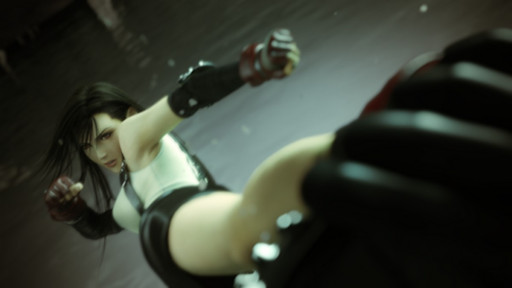
Getting kicked by Tifa Lockhart is never a good thing.

Rose petals usually indicate a romantic evening, but here it’s just an evening of ass kicking.
32. Final Fantasy XIII-2 (2011)
PlayStation 3, Xbox 360
Final Fantasy XIII-2 Gameplay
In the sequel to Final Fantasy XIII, XIII-2 centers around Lightning’s sister, Serah Ferron. After Lightning disappears into an unknown world, Serah and a time traveler, Noel, have to travel through time to find her. Along the way, Serah and Noel must solve numerous paradoxes that have been created and are warping the timeline. While there are numerous villains within this game, the main antagonist is the skewed timeline, which players will travel through in order to save Lightning.
Relased on PlayStation 3, Xbox 360, Windows, iOS, and Android, Final Fantasy XIII-2 reached fifth place in video game sales in 2011 in Japan.
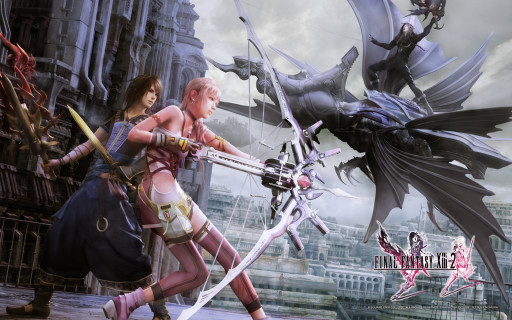
Giant weaponry is a Final Fantasy staple, especially in the XIII series of games.

I think we all know what a relentless assault feels like.
33. Final Fantasy XIV: A Realm Reborn (2013)
Microsoft Windows, PlayStation 3, PlayStation 4 and macOS
While it initially launched to incredibly negative and unfavorable reviews, the release of Final Fantasy XIV: A Realm Reborn was a welcome enhancement of the previous MMORPG Final Fantasy title. With a pretty open storyline, players begin the game with two objectives in mind: stop the Garlean Empire, especially Garlean Legatus Gaius Van Baelsar, and keep the Beastmen tribes from summoning their primals. Because the game is online, the story changes and the main storyline—defeating the Garlean Empire—wraps up after the first series of main missions.
With the ability to customize characters down to the size of their breasts, as well as a distinct difference in the leveling up system from Final Fantasy XI, Final Fantasy XIV has been a welcome upgrade from the grind system present in XI. If you haven’t played the expansion Heavensward, we highly recommend you do. The addition of flying mounts, new jobs, and vast, beautiful new zones to explore is just too awesome to miss.
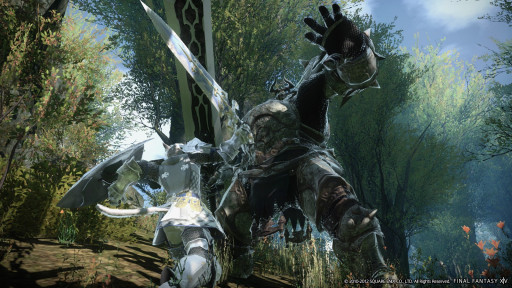
Here we have a Paladin and a Dullahan seeing whose sword is bigger.
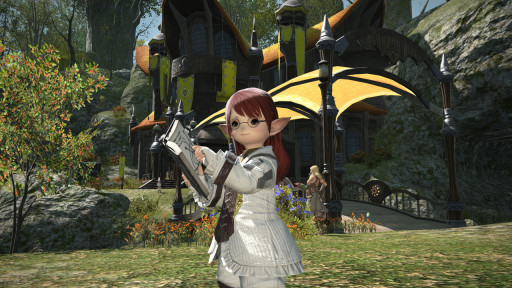
A Lalafell Summoner doing what Summoners do best: reading while their summon does the heavy lifting.
34. Lightning Returns: Final Fantasy XIII (2014)
(PlayStation 3, Xbox 360, Android, Microsoft Windows, iOS)
Lightning Returns: Final Fantasy XIII Gameplay
Set 500 years after the events of Final Fantasy XIII-2, Lightning Returns takes a more traditional approach to the Final Fantasy series in that it moves back to the hero attempting to save the world from destruction. As the game begins, Lightning awakens from a self-imposed hibernation. She discovers the world is going to end in 13 days, but the god Bhunivelze has decided she should save the people—including her heavily burdened friends and allies. Like previous Final Fantasy titles, the villain in this game is right under the protagonist’s nose.
Released on PlayStation 3 and Xbox 360 in 2014, Windows in 2015, and Android and iOS in 2016, Lightning Returns was the 17th best-selling game in Japan in 2013.

But don’t worry. Lightning doesn’t take betrayal too lightly… Get it? I’ll show myself out.

I don’t know who’s scarier: Lightning or the monster she’s fighting.
35. Final Fantasy XV (2016)
(PlayStation 4, Xbox One)
Final Fantasy XV Gameplay Preview
The last game on our list—but definitely not Square’s last game—is Final Fantasy XV. With a tighter focus on characters that are more realistic and human, XV takes place on an Earth-type world called Eos and is governed under the Niflheim Empire. When the Kingdom of Lucis, which falls outside of Niflheim’s reign, is attacked by Niflheim, Noctis Lucis Caelum, the protagonist in the game, goes on the run. Like any good Final Fantasy game, the objective is to take down the Niflheim Empire and snatch the crystal from their clutches.
With an open-world and a combat system similar to Kingdom Hearts, it appears that XV will be mixing the mythos of the Fabula Nova Crystallis world (of which Final Fantasy Type-0 and XIII are apart) with a dark, human atmosphere. We’ll find out in September when the game is released on both PlayStation 4 and Xbox One.

Just another beautiful day for shopping at the market.

What we do know for sure is that this Marlboro will get you.
And that’s our list of every Final Fantasy game since 1987. If there’s a Final Fantasy title on here that we missed, let us know by commenting below. Chances are, we didn’t include it because it’s part of its own series and not part of the main Final Fantasy franchise.
You might also be interested in…
